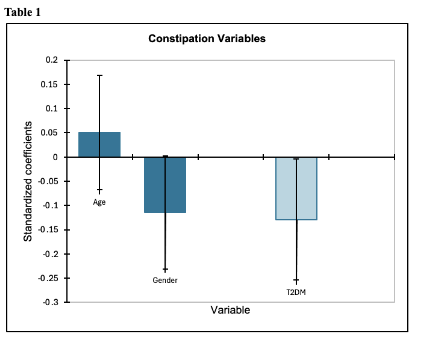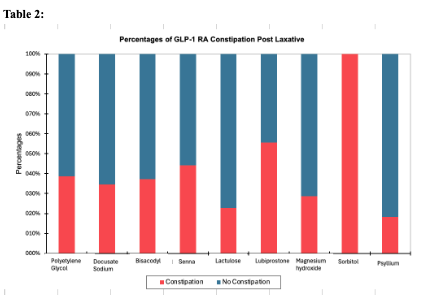Monday Poster Session
Category: Diet, Nutrition, and Obesity
P2710 - Efficacy of Bowel Regimen on GLP1-RA-Induced Constipation
Monday, October 27, 2025
10:30 AM - 4:00 PM PDT
Location: Exhibit Hall

Suria Devarapalli, DO
University of Arkansas for Medical Sciences
Little Rock, AR
Presenting Author(s)
Suria Devarapalli, DO1, Benjamin Blaske, MD1, Jeffrey Henson, MD2, Meer A. Ali, MD1
1University of Arkansas for Medical Sciences, Little Rock, AR; 2University of Arkansas, Little Rock, AR
Introduction: The class of long acting glucagon-like peptide-1 receptor agonists (GLP1-RA) has become prevalent in modern medical practice. Their effects on delayed gastric emptying have been increasingly concerning, particularly in regard to procedures. This delayed gastric emptying with GLP1-RAs commonly result in constipation as a common side effect. Our study aimed to investigate the effectiveness of various bowel regimen treatments in patients who developed constipation after starting GLP1-RA therapy.
Methods: A single-center, retrospective study in the outpatient setting was performed to evaluate the effects of various bowel regimens on GLP-1 induced constipation. Data was queried utilizing an electronic patient data registry and included information on patient demographics, medication usage, and outcome variables. Statistical analyses comprised descriptive statistics, chi-square testing were used to address the primary study endpoints. A post hoc analysis for their respective primary statistical analyses for head-to-head comparison of different bowel regimens.
Results: Our cohort consisted of 410 patients who received one of nine GLP1-RAs and one of nine bowel regimens. Logistic regression analysis was performed to assess the effect of diabetes, patient age, sex, baseline constipation, and specific type of GLP-1 RA on the odds of developing constipation after both GLP-1 RA use and subsequent bowel regimen initiation. The results revealed that younger age and usage of post-GLP-1 RA laxative were the only factors that reduced risk of constipation, OR 0.977, (95% CI 0.959-0.996) and OR 0.431, (95% CI 0.279-0.663) respectively (Table 1). Chi-square testing did not show a significant difference in constipation reduction between bowel regimens p = 0.182. Proportional z-score analysis for rates of GLP-1 RA induced constipation by bowel regimen was significant at p < 0.05. Post-hoc analysis revealed significant differences among various bowel regimens with most superior to psyllium.
Discussion: As GLP-1 RA becomes increasingly prevalent in our society, their use is typically associated with worsening constipation. Although there was no significant difference observed between specific GLP-1 RA resulting in causing constipation or bowel regimen to improve constipation. We did identify most bowel regimen were more superior compared to psyllium.

Figure: Constipation Variables

Figure: Percentages of GLP-1 RA Constipation Post Laxative
Disclosures:
Suria Devarapalli indicated no relevant financial relationships.
Benjamin Blaske indicated no relevant financial relationships.
Jeffrey Henson indicated no relevant financial relationships.
Meer Ali indicated no relevant financial relationships.
Suria Devarapalli, DO1, Benjamin Blaske, MD1, Jeffrey Henson, MD2, Meer A. Ali, MD1. P2710 - Efficacy of Bowel Regimen on GLP1-RA-Induced Constipation, ACG 2025 Annual Scientific Meeting Abstracts. Phoenix, AZ: American College of Gastroenterology.
1University of Arkansas for Medical Sciences, Little Rock, AR; 2University of Arkansas, Little Rock, AR
Introduction: The class of long acting glucagon-like peptide-1 receptor agonists (GLP1-RA) has become prevalent in modern medical practice. Their effects on delayed gastric emptying have been increasingly concerning, particularly in regard to procedures. This delayed gastric emptying with GLP1-RAs commonly result in constipation as a common side effect. Our study aimed to investigate the effectiveness of various bowel regimen treatments in patients who developed constipation after starting GLP1-RA therapy.
Methods: A single-center, retrospective study in the outpatient setting was performed to evaluate the effects of various bowel regimens on GLP-1 induced constipation. Data was queried utilizing an electronic patient data registry and included information on patient demographics, medication usage, and outcome variables. Statistical analyses comprised descriptive statistics, chi-square testing were used to address the primary study endpoints. A post hoc analysis for their respective primary statistical analyses for head-to-head comparison of different bowel regimens.
Results: Our cohort consisted of 410 patients who received one of nine GLP1-RAs and one of nine bowel regimens. Logistic regression analysis was performed to assess the effect of diabetes, patient age, sex, baseline constipation, and specific type of GLP-1 RA on the odds of developing constipation after both GLP-1 RA use and subsequent bowel regimen initiation. The results revealed that younger age and usage of post-GLP-1 RA laxative were the only factors that reduced risk of constipation, OR 0.977, (95% CI 0.959-0.996) and OR 0.431, (95% CI 0.279-0.663) respectively (Table 1). Chi-square testing did not show a significant difference in constipation reduction between bowel regimens p = 0.182. Proportional z-score analysis for rates of GLP-1 RA induced constipation by bowel regimen was significant at p < 0.05. Post-hoc analysis revealed significant differences among various bowel regimens with most superior to psyllium.
Discussion: As GLP-1 RA becomes increasingly prevalent in our society, their use is typically associated with worsening constipation. Although there was no significant difference observed between specific GLP-1 RA resulting in causing constipation or bowel regimen to improve constipation. We did identify most bowel regimen were more superior compared to psyllium.

Figure: Constipation Variables

Figure: Percentages of GLP-1 RA Constipation Post Laxative
Disclosures:
Suria Devarapalli indicated no relevant financial relationships.
Benjamin Blaske indicated no relevant financial relationships.
Jeffrey Henson indicated no relevant financial relationships.
Meer Ali indicated no relevant financial relationships.
Suria Devarapalli, DO1, Benjamin Blaske, MD1, Jeffrey Henson, MD2, Meer A. Ali, MD1. P2710 - Efficacy of Bowel Regimen on GLP1-RA-Induced Constipation, ACG 2025 Annual Scientific Meeting Abstracts. Phoenix, AZ: American College of Gastroenterology.
